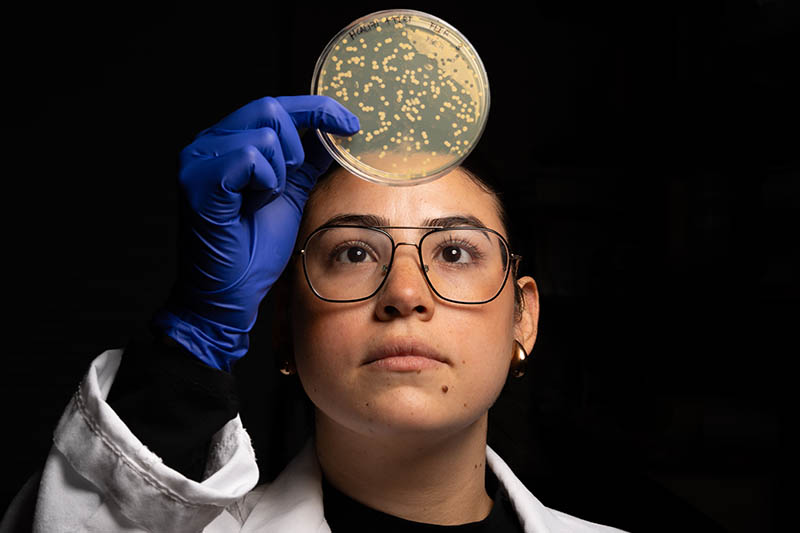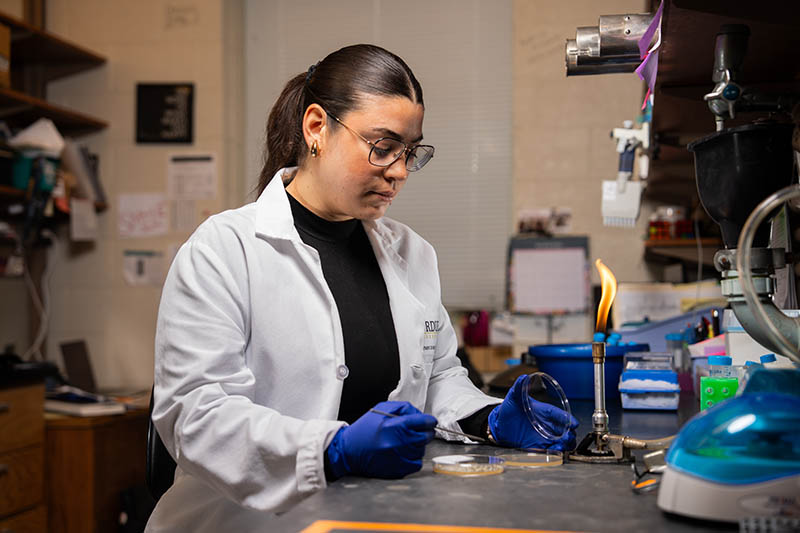Michelle Lihon - Graduate Ag Research Spotlight
My passion comes from learning something new and not only bringing it into the field but bringing it back to our lab and helping move our research faster.
- Michelle Lihon, Biochemistry
The student
Michelle Lihon is a third-generation scientist. Her father works in biotechnology, and her grandfather was a biology professor in Lihon’s native Caracas, Venezuela.
When talking about her grandfather she said, “He always taught me science-related things, and if I asked a question, he would always have a very scientific explanation.” This instilled a deep fascination with science.
So when Lihon started college at Suffolk University in Boston, science was the clear choice. At first, she thought she’d study chemistry, but after attending a biology class she fell in love with the subject. She switched to biochemistry and never looked back. After graduation she went to work at the pharmaceutical company AbbVie, working on optimization of monoclonal antibodies that were close to being ready to market. She enjoyed the work, but was always curious about the earlier steps in the process: how did the molecules come to be? How did the scientists choose specific targets? How were the antibodies designed? She realized she wanted to go back to school to learn more. She began her PhD at Purdue in 2020.
The research
Lihon is a member of Mark Hall’s lab, working on cell cycle regulation and fungal pathogenesis. She’s currently working on two papers. The first one looks at new technologies to degrade specific proteins in pathogenic fungi, demonstrating the method as a tool to study novel antifungal targets. The second paper looks at how a specific enzyme contributes to fungal pathogenesis, and how targeting this enzyme could help fight treatment-resistant fungal infections. She is applying “omics” approaches to this work, to identify and understand what this enzyme is doing at a molecular level.
Currently a fifth-year student, Lihon will start writing her dissertation next year.
“It’s something my lab hasn’t done before, and my passion comes from learning something new and not only bringing it into the field but bringing it back to our lab and helping move our research faster,” she says.
Opportunities
Lihon chose Purdue after attending a recruitment weekend and finding the biochemistry faculty extremely welcoming.
“They were all very easy to talk to,” she said. “I saw I would be surrounded by good mentors.”
She also liked that she’d be able to explore her interests by doing rotations before choosing a lab to join. Additionally, the department had many awards and funding opportunities for grad students to attend conferences and courses. Lihon was able to take advantage of one of these opportunities by spending a summer attending a mycology course at the Marine Biological Laboratory at Woods Hole.
She’s found Mark Hall to be exactly the kind of mentor she hoped for when choosing Purdue. “He teaches you to be scientifically rigorous, but he also has a lot of patience,” she says.
Future plans
After graduation, Lihon plans to go back to industry. She’d like to work with mass spectrometry to improve drug discovery or identify biomarkers for different diseases. She’ll be doing an industry internship this summer, getting her closer to her goal.
When she’s not in the lab, she likes to try new restaurants – she highly recommends Lafayette’s Revolution Barbecue. She also likes to lift weights and has found a “new obsession” in pickleball. Her lab has regular pickleball games, where they compete against other labs in the biochemistry department. “It’s pretty fun,” she says.







